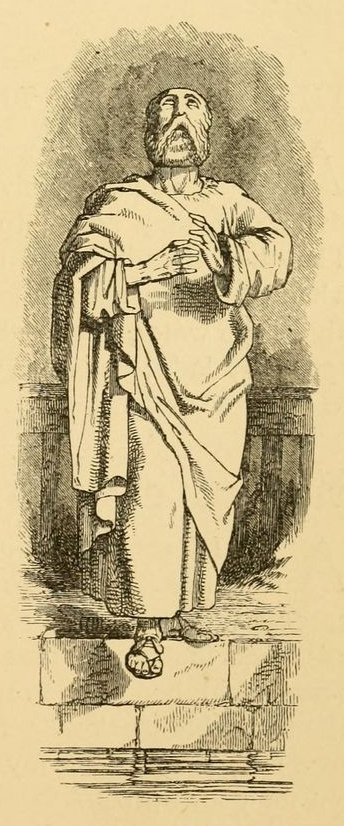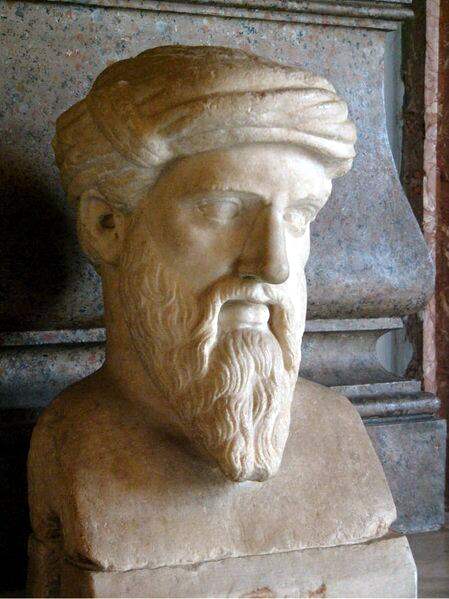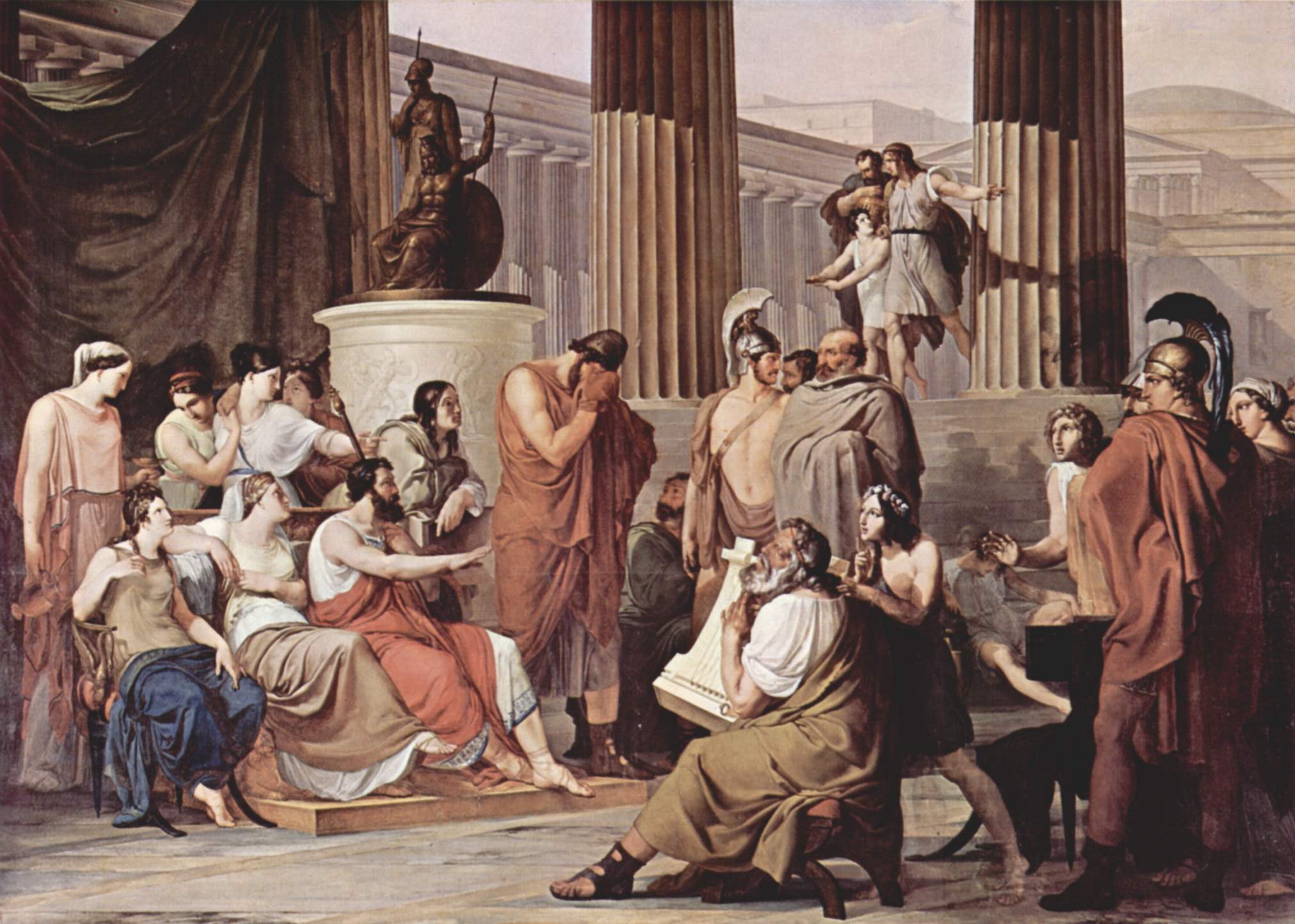|
Terpsion
Terpsion (, ''gen''.: ; fl. 5th–4th century BCE) of Megara is a speaker in Plato's dialogues. In the frame story which serves as the prologue to Plato's '' Theaetetus'', Terpsion asks his friend Euclid of Megara to recount the dialogue between Socrates and Theaetetus. Terpsion also appears in the ''Phaedo'' as one of the people who was present at the death of Socrates. Debra Nails states that nothing else reliable can be determined about Terpsion, and all later sources that mention him, such as Plutarch and the pseudonymous Socratic letters, are derived from the account in Plato's dialogues. See also *List of speakers in Plato's dialogues following is a list of the speakers found in the dialogues traditionally ascribed to Plato, including extensively quoted, indirect and conjured speakers. Dialogues, as well as Platonic ''Epistles'' and ''Epigrams'', in which these individuals app ... Notes {{reflist 4th-century BC Greek people Ancient Megarians ... [...More Info...] [...Related Items...] OR: [Wikipedia] [Google] [Baidu] |
Theaetetus (dialogue)
The ''Theaetetus'' (; ''Theaítētos'', Latinisation of names, lat. ''Theaetetus'') is a philosophical work written by Plato in the early-middle 4th century BCE that investigates the definitions of knowledge, nature of knowledge, and is considered one of the founding works of epistemology. Like many of Plato's works, the ''Theaetetus'' is written in the form of a Socratic dialogue, dialogue, in this case between Socrates and the young mathematician Theaetetus (mathematician), Theaetetus and his teacher Theodorus of Cyrene. In the dialogue, Socrates and Theaetetus attempt to come up with a definition of ''episteme'', or knowledge, and discuss three definitions of knowledge: knowledge as nothing but ''perception'', knowledge as ''true judgment'', and, finally, knowledge as a ''Belief#Justified true belief, true judgment with an account.'' Each of these definitions is shown to be unsatisfactory as the dialogue ends in aporia as Socrates leaves to face a hearing for his trial for ... [...More Info...] [...Related Items...] OR: [Wikipedia] [Google] [Baidu] |
Phaedo
''Phaedo'' (; , ''Phaidōn'') is a dialogue written by Plato, in which Socrates discusses the immortality of the soul and the nature of the afterlife with his friends in the hours leading up to his death. Socrates explores various arguments for the soul's immortality with the Pythagorean philosophers Simmias and Cebes of Thebes in order to show that there is an afterlife in which the soul will dwell following death. The dialogue concludes with a mythological narrative of the descent into Tarturus and an account of Socrates' final moments before his execution. Background The dialogue is set in 399 BCE, in an Athenian prison, during the last hours prior to the death of Socrates. It is presented within a frame story by Phaedo of Elis, who is recounting the events to Echecrates, a Pythagorean philosopher. Characters Speakers in the frame story: * Phaedo of Elis: a follower of Socrates, a youth allegedly enslaved as a prisoner of war, whose freedom was purchased at Soc ... [...More Info...] [...Related Items...] OR: [Wikipedia] [Google] [Baidu] |
List Of Speakers In Plato's Dialogues
following is a list of the speakers found in the dialogues traditionally ascribed to Plato, including extensively quoted, indirect and conjured speakers. Dialogues, as well as Platonic ''Epistles'' and ''Epigrams'', in which these individuals appear dramatically but do not speak are listed separately. List ;Unnamed speakers Notes Bibliography * Debra Nails. ''The People of Plato: A Prosopography of Plato and Other Socratics''. Hackett Publishing, 2002. . * Plato Plato ( ; Greek language, Greek: , ; born BC, died 348/347 BC) was an ancient Greek philosopher of the Classical Greece, Classical period who is considered a foundational thinker in Western philosophy and an innovator of the writte .... ''Complete Works''. Ed: John M. Cooper. Hackett Publishing, 1997. {{Socrates navbox * Platos Dialogues Speakers in Plato's dialogues ... [...More Info...] [...Related Items...] OR: [Wikipedia] [Google] [Baidu] |
Megara
Megara (; , ) is a historic town and a municipality in West Attica, Greece. It lies in the northern section of the Isthmus of Corinth opposite the island of Salamis Island, Salamis, which belonged to Megara in archaic times, before being taken by Athens. Megara was one of the four districts of Attica, embodied in the four mythic sons of King Pandion II, of whom Nisos was the ruler of Megara. Megara was also a trade port, its people using their ships and wealth as a way to gain leverage on armies of neighboring poleis. Megara specialized in the exportation of wool and other animal products including livestock such as horses. It possessed two harbors, Pagae to the west on the Corinthian Gulf, and Nisaea to the east on the Saronic Gulf of the Aegean Sea. History Late Bronze Mycenaean period In the Late Bronze Age, Megara features prominently as a small kingdom in the myths and legends of Homer. Megara emerged between two fortified ports, Nisaea on the Saronic Gulf and Pagae on the ... [...More Info...] [...Related Items...] OR: [Wikipedia] [Google] [Baidu] |
Plato
Plato ( ; Greek language, Greek: , ; born BC, died 348/347 BC) was an ancient Greek philosopher of the Classical Greece, Classical period who is considered a foundational thinker in Western philosophy and an innovator of the written dialogue and dialectic forms. He influenced all the major areas of theoretical philosophy and practical philosophy, and was the founder of the Platonic Academy, a philosophical school in History of Athens, Athens where Plato taught the doctrines that would later become known as Platonism. Plato's most famous contribution is the theory of forms, theory of forms (or ideas), which aims to solve what is now known as the problem of universals. He was influenced by the pre-Socratic thinkers Pythagoras, Heraclitus, and Parmenides, although much of what is known about them is derived from Plato himself. Along with his teacher Socrates, and his student Aristotle, Plato is a central figure in the history of Western philosophy. Plato's complete ... [...More Info...] [...Related Items...] OR: [Wikipedia] [Google] [Baidu] |
Frame Story
A frame story (also known as a frame tale, frame narrative, sandwich narrative, or intercalation) is a literary technique that serves as a companion piece to a story within a story, where an introductory or main narrative sets the stage either for a more emphasized second narrative or for a set of shorter stories. The frame story leads readers from a first story into one or more other stories within it. The frame story may also be used to inform readers about aspects of the secondary narrative(s) that may otherwise be hard to understand. This should not be confused with narrative structure. Notable examples are the ''1001 Nights'' and ''The Decameron''. Origins Some of the earliest frame stories are from ancient Egypt, including one in the Papyrus Westcar, the ''Tale of the Shipwrecked Sailor'', and ''The Eloquent Peasant''. Other early examples are from Indian literature, including the Indian epic poetry, Sanskrit epics ''Mahabharata'', ''Ramayana'', ''Panchatantra'', Syntipas ... [...More Info...] [...Related Items...] OR: [Wikipedia] [Google] [Baidu] |
Euclid Of Megara
Euclid of Megara (; ; c. 435 – c. 365 BC) was a Greek Socratic philosopher who founded the Megarian school of philosophy. He was a pupil of Socrates in the late 5th century BC, and was present at his death. He held the supreme good to be one, eternal and unchangeable, and denied the existence of anything contrary to the good. Editors and translators in the Middle Ages often confused him with Euclid of Alexandria when discussing the latter's '' Elements''. Life Euclid was born in Megara. In Athens he became a follower of Socrates: so eager was he to hear the teaching and discourse of Socrates, that when, for a time, Athens had a ban on any citizen of Megara entering the city, Euclid would sneak into Athens after nightfall disguised as a woman, to hear him speak. He is represented in the preface of Plato's '' Theaetetus'' as being responsible for writing down the conversation between Socrates and the young Theaetetus many years earlier. Socrates is also supposed to have re ... [...More Info...] [...Related Items...] OR: [Wikipedia] [Google] [Baidu] |
Theaetetus (mathematician)
Theaetetus of Athens (; ''Theaítētos''; c. 417 – c. 369 BCE), possibly the son of Euphronius of the Athenian deme Sunium, was a Greece, Greek mathematician. His principal contributions were on irrational number, irrational lengths, which was included in Book X of Euclid's Elements, Euclid's ''Elements'' and proving that there are precisely five Platonic solid, regular convex polyhedra. A friend of Socrates and Plato, he is the central character in Plato's Theaetetus (dialogue), eponymous Socratic dialogue. Theaetetus, like Plato, was a student of the Greek mathematician Theodorus of Cyrene. Cyrene was a prosperous Greek colony on the coast of North Africa, in what is now Libya, on the eastern end of the Gulf of Sidra. Theodorus had explored the theory of incommensurable quantities, and Theaetetus continued those studies with great enthusiasm; specifically, he classified various forms of irrational numbers according to the way they are expressed as square roots. This theory ... [...More Info...] [...Related Items...] OR: [Wikipedia] [Google] [Baidu] |
Debra Nails
Debra Nails (born November 15, 1950) is an American philosophy professor who taught at Michigan State University. Nails earned her M.A. in philosophy and classical Greek from Louisiana State University before going on to earn a Ph.D. in philosophy at the University of the Witwatersrand, Johannesburg in 1993.Michigan State University/philosophy/Debra Nails (accessed July 11, 2016) Previously, she taught in the Department of Classics, Philosophy, and Religion at Mary Washington College. Nails taught courses on the history of philosophy, continental rationalism, metaphysics, and modern philosophy. Contributions to philosophy Nails' work primarily focuses on ancient Greek philosophy, metaphysics, fem ...[...More Info...] [...Related Items...] OR: [Wikipedia] [Google] [Baidu] |
Plutarch
Plutarch (; , ''Ploútarchos'', ; – 120s) was a Greek Middle Platonist philosopher, historian, biographer, essayist, and priest at the Temple of Apollo (Delphi), Temple of Apollo in Delphi. He is known primarily for his ''Parallel Lives'', a series of biographies of illustrious Greeks and Romans, and ''Moralia'', a collection of essays and speeches. Upon becoming a Roman citizen, he was possibly named Lucius Mestrius Plutarchus (). Family Plutarch was born to a prominent family in the small town of Chaeronea, about east of Delphi, in the Greek region of Boeotia. His family was long established in the town; his father was named Autobulus and his grandfather was named Lamprias. His brothers, Timon and Lamprias, are frequently mentioned in his essays and dialogues, which speak of Timon in particular in the most affectionate terms. Studies and life Plutarch studied mathematics and philosophy in Athens under Ammonius of Athens, Ammonius from AD 66 to 67. He attended th ... [...More Info...] [...Related Items...] OR: [Wikipedia] [Google] [Baidu] |
4th-century BC Greek People
The 4th century was the time period from 301 CE (represented by the Roman numerals CCCI) to 400 CE (CD) in accordance with the Julian calendar. In the West, the early part of the century was shaped by Constantine the Great, who became the first Roman emperor to adopt Christianity. Gaining sole reign of the empire, he is also noted for re-establishing a single imperial capital, choosing the site of ancient Byzantium in 330 (over the current capitals, which had effectively been changed by Diocletian's reforms to Milan in the West, and Nicomedeia in the East) to build the city soon called Nova Roma (New Rome); it was later renamed Constantinople in his honor. The last emperor to control both the eastern and western halves of the empire was Theodosius I. As the century progressed after his death, it became increasingly apparent that the empire had changed in many ways since the time of Augustus. The two-emperor system originally established by Diocletian in the previous century fel ... [...More Info...] [...Related Items...] OR: [Wikipedia] [Google] [Baidu] |






